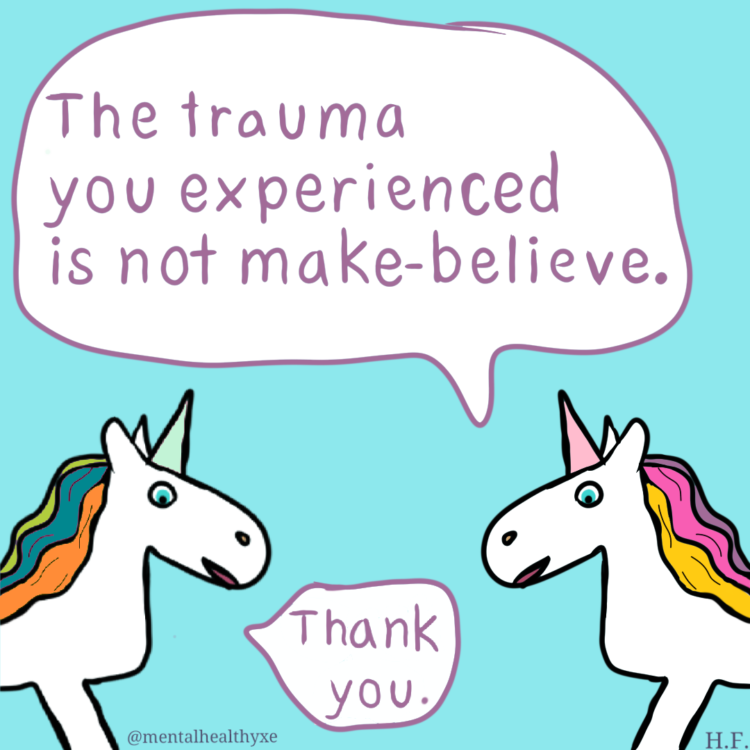5 Simple Steps to Support Someone Who Discloses Their Sexual Assault
Editor's Note
If you’ve experienced sexual abuse or assault, the following post could be potentially triggering. You can contact The National Sexual Assault Telephone Hotline at 1-800-656-4673.
April is Sexual Assault Awareness Month. It is a specific time we can set aside to recognize that sexual assault can and does impact people from all walks of life. We can also use this as a time to give some extra attention to learning about how we can better support survivors. Perhaps you yourself are a survivor. Perhaps you are already a great support to someone in your life. I too am a survivor and an advocate. I think that what I have to share can be helpful for us all.
“I’ve been sexually assaulted.”
How would you respond to a disclosure of this nature? Would you know what to say or do? Would you know what you might want to avoid saying or doing?
It’s been my experience that responses to this type of disclosure often fall somewhere on a spectrum of helpful – unhelpful – harmful. I think most people do genuinely want to help or hold space for these disclosures, but may simply be unprepared to do so.
There are five simple steps that can support us in responding in an empathetic way to disclosures of sexual assault. I believe that no matter who you are, friend, dentist, classmate, neighbor, cousin or yoga instructor– these steps are something anyone can learn. Note that these suggestions will not work for each and every person or situation. I suggest you use these steps as a guide for the roads you could take to get to the important destination of thoughtfully supporting survivors.
1. Listen
Listening is a learned skill and it takes some practice. Think about the last time you felt heard, what was it that the listener was doing? Listening means that you will likely be talking less. It means you focus on what’s being said and not on creating the perfect response. Short affirmations of understanding can be helpful– things like “Yes” “Uh huh” and “I understand.” Sometimes repeating what you’ve heard back to the individual can also help them feel heard. Try not to rush someone who is struggling to get the words out, be patient.
If you feel you are not able to listen to a disclosure you can still uphold this principal by letting the individual know how important it is to you that they be properly heard. You can thank them for coming to you and offer an alternative person or resource. Be clear that it’s not about them, but your ability to help at this time.
2. Sit With Their Pain
Sitting with someone in their pain can be hard to do. If you can, do it anyways. What does this mean exactly? I’ve always appreciated this brief conversation that takes place in the movie “Lars and the Real Girl.” I feel it illustrates it poignantly.
“We came over to sit. That’s what people do when tragedy strikes. They come over and sit.”
To sit with someone in their emotions is to accept the fact that they have been through something for which possibly no words will do. We can honor and give space for feelings, especially the messy ones. Giving space is also about avoiding the rush to “fix” or lighten the mood.
If you feel you are unable to sit with them, you may be able to help the individual figure out who can fill this need. This could be a different friend, a counsellor, support group or even a pet. In the meantime you may even want to work on gaining this skill, which is a helpful one to have for many situations.
3. Validate them
“Victim blaming” is obviously a common occurrence, or we wouldn’t have a term for it in our language. One of the explanations around victim blaming is that we as a society struggle to understand and accept that there are abusive and violent people within our circles, or that we ourselves may be one. Our minds therefore turn to shifting the blame onto the survivor. In a nutshell, this defense wrongly transfers the guilt off of “us” for not recognizing and stopping the harmful behavior of the abusive person amongst us. It’s “easier” to ask a question like “What were they wearing?” rather than “In what ways am I contributing to rape culture?”
Due to this blaming, it is all too common for survivors to have their experiences questioned, ignored or scrutinized. It’s also common for survivors to do a lot of this blaming towards themselves. This can in fact also be a type of coping mechanism. What may be happening here is that the brain tries its best to conceptualize life into an orderly and predictable world. If I do X, Y happens, therefore I should have done Z and will now forever only do Z. The disruptive side effect to the brain trying to organize things in this way can cause destructive guilt and shaming of the self.
Be the person that doesn’t blame, ignore or question survivors.
Adopt a judgement free attitude, in fact you may want to explicitly state to a survivor that you are not judging or looking down on them. Where there is guilt, shame, and self-blame, do your best to point out that while those feelings are real, feelings aren’t facts.
If you are not able to hear a disclosure, you can still validate it by letting the person know you believe them that this abuse occurred and you would like to know how you can be otherwise supportive. You can also help by educating yourself and not tolerating victim blaming in society.
4. Clarify Needs
Clarifying needs is about recognizing that unless you are a mind reader, you don’t automatically know why a person has disclosed to you. So long as it feels appropriate, you can ask. This can be as simple as fulfilling the above steps and then saying something like “Thank-you for trusting me with this. I want to make sure that you get what you need from me today. Was there anything you were hoping I could do.”
Clarifying needs is also about recognizing that we are humans and humans often misunderstand or miscommunicate. In case you are unsure about what I mean, here are some examples. Someone shares with you, after which you think the individual came to you for help with making a police report. You ask them if this is the case, and they say no they came to you because of a mental health book you mentioned in class. Another scenario could be you may think that the person “needs” to speak to a therapist, when in fact they are sharing with you because they want to discuss a way you could support them by not engaging in a behavior that they may find triggering.
In some cases, needs may seem obvious or be very urgent. Regardless, it’s almost always still possible to do check-ins as well as to provide options and choices.
Anyone can clarify needs. In fact this may be an especially helpful role for someone unable to hear a disclosure. Depending on the situation and what your relationship is, it could be possible that you can help with fulfilling a need without hearing details. This could mean adopting trauma informed approaches, discussing boundaries and limits, providing information and resources and so on. It could also be that the need is for someone to sit quietly with them, and again this may be possible for you to do. And as I’ve mentioned many times already, you can choose to redirect someone and if so you’d need to know who or what, they are looking for.
5. Safety & Future Steps
This step will fluctuate depending on a vast number of variables and of course the survivors’ wishes. It could be that there is immediate health and safety concerns that need addressing; there can still be plenty of choice involved in such situations. It is also possible that the assault or abuse that occurred was further in the past and there are no present-day safety concerns. Likewise this need may fall somewhere in the middle. Regardless of where on the spectrum of safety things are, don’t forget to keep the survivors wishes at the forefront. Planning out future steps may involve concrete actions such as going to a support group or agreeing to watch a video together. Whatever is decided, it can be useful to conceptualize it as an on-going conversation.
On a personal note, as a survivor, something I find difficult to deal with is when I disclose (to just about anyone but especially with professionals’) and there is an assumption that it is a “one and done” conversation. I am a whole person and where I am on my healing journey moves forward and back all the time, which also means my needs vary. There are times that I feel having to be the one who has to “bring it up” is an unfair burden on me. It’s nice if there can be an awareness and a sense of responsibility and compassion towards ensuring that I’m feeling safe and doing okay and having an open dialogue about it. Of course this is my job too, but it’s nice to feel like teammates in this regard. Asking isn’t going to upset me, and if I don’t want to talk about it right then, I’ll let you know.
If you are unable to do the above steps, it may be possible that you move from someone asking to speak to you about an assault or abuse (and because you are unable) you will move into future planning right away. This is okay. Your roll may again be to suggest some other options or resources. You may also be able to check in at a later date to see how things are going.
In honor of Sexual Assault Awareness month, if you haven’t already done so, seek out a list or create one of your own, and fill it with important resources and support options that you could suggest to someone in need, or you can do the same just for you. There are a large variety of websites, hotlines, support groups, therapists, books and more that can be very helpful. Be sure to check out your local groups and organizations. Save this article and refer back to it if you think it may help. Listen to and sit with survivors. Each individual will have their own reasons for sharing, and it’s important to take the time to really hear what their needs are.
Each person who has experienced sexual assault will have their own wants and needs around how they best want to be supported when disclosing this information. My list may be missing something that would be important for some, and it may not work in all situations. Please share your ideas and thoughts about these 5 steps in the comments below.

If you’d like to follow along with my journey, you can find me on Instagram as well.
Lead image courtesy of Getty Images.

